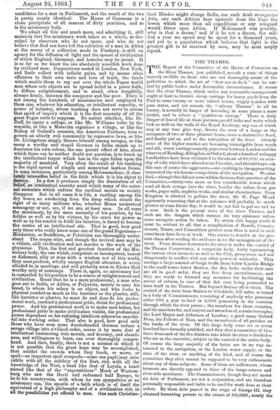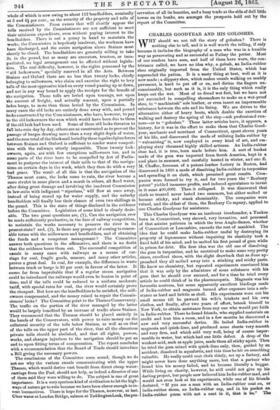THE THAMES.
1TI1E Report of the Committee of the House of Commons on . the River Thames, just published, reveals a state of things scarcely credible to those who are not thoroughly aware of the. perfection to which the art of " how not to do it " can be car- ried by public bodies under favourable circumstances. It seems that the river Thames, which under any reasonable management ought at least to furnish cheap carriage for heavy goods from the Pool to some twenty or more inland towns, supply London with pure water, and yet remain the " silvery Thames" in all its beauty, is actually in danger of becoming in some places a mere rivulet, and in others a " pestiferous swamp." There is daily danger of loss of life at those picturesque old locks and weirs which look so well on the walls of the Royal Academy, any one of which may at any time give way, drown the crew of a barge or the occupants of two or three pleasure boats, cause a destructive flood, and finally put an end to the navigation of the river. Already some of the higher reaches are becoming unnavigable from weeds and silt, water carriage scarcely pays even between London and the wharves of Reading, Abingdon, or Oxford, about a hundred unhappy bondholders have been victimized to the extent of 90,0001. on secu- rity of tolls which have almost ceased to exist, and the railways—in this case of course the aggressors—are exulting in the approaching removal of the wholesome competition of the navigation. We also find,—though this did not come within theitnmcdiate province of the Committee,—thirty-two more or less considerable towns which send all their sewage into the river, besides the refuse from gas works, paper mills, naphtha works, and similar abominations. Even Kingston is allowed to pollute the river, Sir W. Page Wood apparently reasoning that as the nuisance will probably be much greater at some future day, it would be not fair to put an end to it now. Such is the present state of the river Thames, and such are the dangers which menace its very existence unless some energetic action be taken. To attain this happy result it must be evident to all that a complication of Boards, Commis- sioners, Trusts, and Committees greater even than is usual in such casenimst have been at work. One ceases to wonder at the pre- sent chaos after reading the evidence as to the management of the river. From Staines downwards the river is under the control of the Thames Conservadcy, a competent body, fairly representing the various river interests as well as the City, prosperous, and not dangerously in conflict with any other power or authority. They manage a large amount of barge traffic from below London Bridge to the small towns below Staines, the five locks under their care are all in goad order, they are free from encumbrances, and they are ready to forward any measures for facilitating the ascent of salmon, in case of that fish ever being persuaded to trust itself in the Thames. But beyond Staines all is chaos. The control of the river from Staines to Cricklade, 107 miles, is vested in a body of Commissioners, consisting of anybody who possesses either 1001. a year in land or 3,0001. personalty in the counties through which the river passes ; the members for those counties, and the members for, and mayors and recorders of, certain boroughs; the Lord Mayor and Aldermen of London ; a good many Oxford Dons, the Fellows of Eton, and the incumbents of all parishes on the banks of the river. Of this large body some six or seven hundred have formally qualified, and they elect a committee of 15 — three from each of the five districts into which the river is divided— who act as the executive, subject to the control of the entire body. Of course the large majority of the latter are in no way in- terested in the navigation, or the London water supply, or the state of the river, or anything of the kind, and of course the committee they elect cannot be supposed to be very enthusiastic about any of those subjects. Some of them are millowners, whose interests are directly opposed to those of the barge-owners and river-side merchants. The Commissioners, though they act under six Acts of Parliament, are not a corporation, and are therefore personally responsible and liable to be sued for work done at their orders. By three Acts passed in the reign of George III. they obtained borrowing powers to the extent of 100,0001., nearly the whole which is now owing to about 112 bondholders, nominally at 5 and 41 per cent., on the security of the property and tolls of the Commissioners. From causes that will shortly appear the tolls received by the Commissioners are not sufficient to meet their minimum expenditure, even without paying interest to the bondholders. There is not a penny in hand to maintain the works, the Commission is hopelessly insolvent, the-workmen have been discharged, and the entire navigation above Staines must shortly be closed. The bondholders are generally willing to take 2s. in the pound, but as many are executors, trustees, or inca- pacitated, no legal arrangement can be effected without legisla- tion. The real difficulty, however, is the rights possessed by the "old lockowners," specially reserved in all the Acts. Between Staines and Oxford there are no less than twenty locks, chiefly belonging to millowners, who claim and exercise the right to levy tolls of the most oppressive kind on every vessel passing up or down, and not in any way bound to apply the receipts for the benefit of the navigation. These tolls are levied upon tonnage, not upon the amount of freight, and actually amount, upon a partially laden barge, to more than those levied by the Commission. In many cases the old locks are entirely done away with, and pound locks constructed by the Commissioners, who have, however, to pay to the old lockowners the sum which would have been due to them if the old lock had been used. Some of these old locks threaten to fall into ruin day by day, others are so constructed as to prevent the passage of barges drawing more than a very slight depth of water, and the sum total of the blackmail leviedby these legalized plunderers between Staines and Oxford is sufficient to render water competi- tion with the railways utterly impossible. These twenty lock- owners, again, are with few exceptions millowners too, and in some parts of the river have to be compelled by Act of Parlia- ment to postpone the interest of their mills to that of the naviga- tions on certain days in the week, which they then do with a very bad grace. The result of all this is that the navigation of the Thames must cease, the locks come to ruin, the river become a mere rivulet in some places and a marsh in others, all flood water, after doing great damage and involving the insolvent Commission in law-suits with indignant " iiparians," will flow at once away, instead of being stored up for water supply, and the unlucky bondholders will finally lose their chance of even two shillings in the pound. This is the state of things disclosed in the evidence before the Committee. Legislation of some kind is clearly desir- able. The two great questions are, (1), Can the navigation ever be made sufficiently productive, in the face of railway competition, to maintain the works necessary to preserve the river in its present state? and, (2), Is there any prospect of coming to reason- able terms with the millowners and bondholders, and of obtaining the funds and a competent management ? The Committee answer both questions in the affirmative, and there is no doubt that the evidence bears them out. The successful competition of canals in many cases with railways as a means of car- riage for coal, fragile goods, manure, and many other articles, proves a great deal. In coal, for example, the difference in waste between truck or barge is 30 per cent. in favour of the latter. It seems far from improbable that if a regular steam navigation could be introduced the railways would even be beaten in point of time, and if the tolls could be reduced to a uniform moderate tariff, with special rates for coal, the river would certainly prove the cheapest. But how are the bondholders to be satisfied, the mill- owners compensated, and the money raised to repair the Commis- sioners' locks? The Committee point to the Thames Conservancy. The traffic on the portion of the river managed by the latter would be largely benefited by an increase of traffic above Staines. They recommend that the Thames should be placed entirely in the hands of the Conservators, with power to raise money on the collateral security of the tolls below Staines, as well as on that of the tolls on the upper part of the river, that all the obnoxious private tolls should be abolished, and that all rights, powers, works, and charges injurious to the navigation should be put an end to upon fitting terms of compensation. The report concludes with a recommendation that the Board of Trade should introduce a Bill giving the necessary powers.
The conclusions of the Committee seem sound, though we do not see why the various canals communicating with the upper Thames, which would derive vast benefit from direct cheap water- carriage from the Pool, should not help, as indeed a director of one of them said they were willing to do. The subject is one of great importance. It is a very spurious kind of civilization to let the high- ways of nature go to ruin because we have been clever enough to in- vent locomotives. There is hope for the Thames, however, at last. Clear water at London Bridge, salmon at TeddingtonLock, the pre-
servation of all its beauties, and a busy trade at the side of dull little towns on its banks, are amongst the prospects held out by the report of the Committee.































 Previous page
Previous page